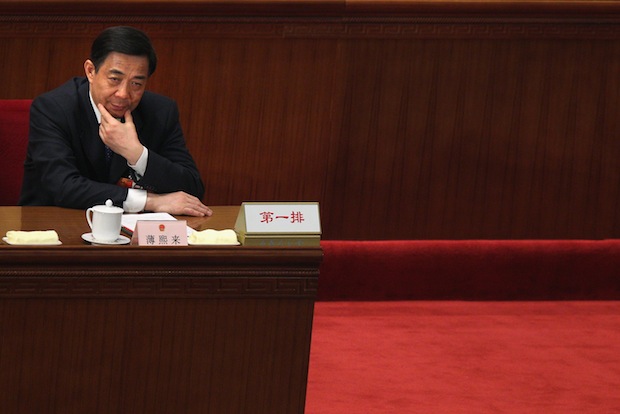In a stuffy courtroom in Jinan, the capital of Shandong province, a major political triumph is being celebrated. Bo Xilai, the Communist princeling, challenged the system and lost, and the system is having its revenge.
Under Marxism-Leninism a trial isn’t an exploration of truth, it’s a balletic demonstration of the rightness of the political system. Accused, witnesses, judges all join in the choreographed display, to prove to everyone’s satisfaction that justice, Chinese-style, is objectively correct. Until recently, the onlookers were expected to burst into delighted applause.
And in case you think this is something Mao Zedong introduced, take a look at the cases of Judge Dee — not Robert van Gulik’s fictional detective, but the genuine Tang Dynasty article. Time and again, before being led off to their excruciatingly unpleasant punishments, the accused would confess their guilt in grovelling terms and thank Dee brokenly for sorting them out. A trial vindicates the rightness of the entire world order.
This, of course, is not how Bo Xilai sees things. He knows that the rough methods he used against the rampant gangster bosses in his fiefdom of Chongqing were fully approved by the party hierarchy, of which he was himself a member. He recently told his lawyer that he wanted a real trial, where he could argue his case in the full hearing of the world’s press. And since the case against him is distinctly dodgy, he might have scored something of a victory.
Hence the huge pressure on Bo not to defend himself, on his wife Gu to give evidence against him, and indirectly on his son Guagua not to make too much noise in distant New York, where he’s attending Columbia Law School.
So what is really going on here? First of all, let me declare an interest. I know Bo Xilai, I like him, and I suspect he may not be guilty of much more than plenty of other senior party functionaries have done. But he was profoundly ambitious, in a system which demands that you should appear quiet and modest.
‘I think 2012 will be my year,’ he told me several years ago. He meant he was expecting to be promoted to the top ranks in the forthcoming leadership, but I had the feeling his eyes were on the topmost position of all: the golden triple, combining General Secretary of the Chinese Communist party, President of the People’s Republic, and Chairman of the Central Military Commission. In the end, of course, all these went to Xi Jinping.
I doubt if Bo could have won the top job anyway. He was too sharp, too question-able, too flashy for the ultra-cautious figures at the top of Chinese politics to give him so much control over their lives and careers. ‘Ah, Mr Bo,’ a senior official once murmured to me over lunch. ‘Always very well dressed.’ It wasn’t meant as a compliment.
If Bo had kept his ambitions to himself, he would probably have ended up as the boss of State and Public Security, with control over China’s judicial system: a hugely influential job. So there’s an irony; if things had turned out differently, Bo Xilai might have been arranging someone else’s show-trial now.
As it is, the event in Jinan sets the seal on Xi Jinping’s triumph. But there’ll be no grandstanding: Mr Xi wants everything, including Bo himself, to be tidied away without creating any further splits in the party. He will have serious problems introducing the reforms he believes are essential; at a time like this, the fewer divisions that exist within the top levels of the party, the better.
But is the trial of Bo Xilai just a bit of political housekeeping, the sorting out of a man with questionable (a Marxist-Leninist would say Bonapartist) tendencies and ideas above his station? Well, maybe. But there’s a another element that you can’t entirely ignore in the whole business: the British link. The fall of Bo Xilai was precipitated by the death of the British businessman Neil Heywood, and the indictment and trial of Bo’s wife, Gu Kailai, for his murder.
Bo was an enthusiastic Anglophile; that was part of his attraction as far as someone like me was concerned. Might there have been a suspicion on the part of the Chinese security system that Heywood was working for MI6, and that he had been sent to Chongqing, where Bo was party boss, in order to pump him for high-level information? Might there even have been a fear that MI6 had recruited Bo himself as an agent of influence?
This can only be speculation, and I accept that it could do even more damage to Bo. But he is finished anyway, his attempt to challenge the Beijing leadership a complete failure. The price he has paid is a very heavy one.
Got something to add? Join the discussion and comment below.
Get 10 issues for just $10
Subscribe to The Spectator Australia today for the next 10 magazine issues, plus full online access, for just $10.
John Simpson is the BBC’s world affairs editor.
You might disagree with half of it, but you’ll enjoy reading all of it. Try your first month for free, then just $2 a week for the remainder of your first year.














Comments
Don't miss out
Join the conversation with other Spectator Australia readers. Subscribe to leave a comment.
SUBSCRIBEAlready a subscriber? Log in